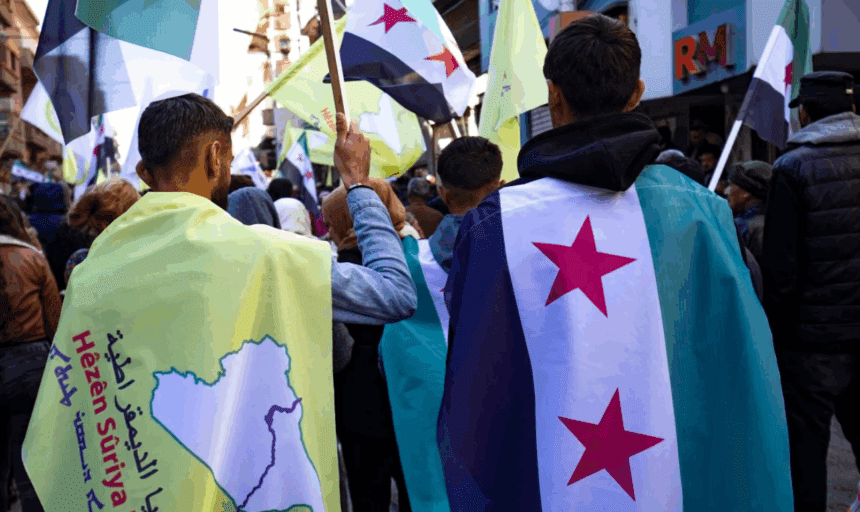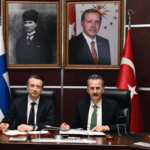Turkey has entered direct negotiations with Syrian Kurdish leaders, including the U.S.-backed Syrian Democratic Forces (SDF), marking a striking departure from years of open hostility and signaling a potential realignment in both Ankara’s Kurdish policy and broader regional strategy.
The ongoing talks, which began covertly in 2024 and have continued into 2025, mark a profound departure from Turkey’s longstanding policy of treating Kurdish groups in Syria as national security threats. The initiative is part of a wider political strategy aimed at ending the war with the outlawed Kurdistan Workers’ Party (PKK) and stabilizing Turkey’s southern border.
According to multiple reports, initial meetings reportedly took place in France and Switzerland, where Turkish officials met senior representatives of the Kurdish-led Autonomous Administration of North and East Syria. These developments come on the heels of Turkey’s March 2024 local elections, in which the opposition Republican People’s Party (CHP) scored a historic nationwide victory with backing from the pro-Kurdish Peoples’ Equality and Democracy Party (DEM Party). In response, President Recep Tayyip Erdoğan’s administration appears to be recalibrating its Kurdish policy to regain electoral support and consolidate his leadership ahead of the 2028 term limit.
Negotiations have also extended to Turkey’s long-detained interlocutor, PKK leader Abdullah Öcalan, whose renewed influence has become central to the process. In a stunning gesture of political reversal, Erdoğan’s far-right coalition partner Devlet Bahçeli called in late 2024 for Öcalan to be allowed to address parliament and even be considered for amnesty, should he help bring an end to the conflict.
On February 27, Öcalan issued a landmark appeal for the PKK to dissolve — a move the PKK leadership in Iraq’s Qandil Mountains publicly accepted in May. The declaration reverberated through Kurdish political circles and lent fresh momentum to parallel negotiations with the SDF.
This comes against the backdrop of seismic changes in Syria. The fall of Bashar al-Assad in December 2024 and the rise of a Sunni-led transitional government under Ahmed al-Sharaa, reportedly aligned with Turkish interests, have removed a major obstacle to Ankara’s regional ambitions. The new Syrian leadership signed an agreement in March with SDF commander Mazloum Kobane — long rumored to be a protégé of Öcalan — to incorporate the SDF into a future Syrian national army. The pact also allows for a decentralized governance model under Damascus’s supervision, a significant concession from the SDF that aligns with Turkey’s red lines.
While Ankara has historically rejected any form of Kurdish autonomy in Syria, officials now appear open to informal self-governance arrangements that fall short of federalism or constitutional recognition. Sources say direct talks between Turkish officials and the SDF — including a meeting held last week in southern Turkey — are being facilitated by the United States.
The discussions are reportedly wide-ranging. Items on the agenda include a phased U.S. military withdrawal from Syria, the future of ISIL detainees held by the SDF, and the integration of Kurdish forces into Syria’s new military structure. The potential reopening of the Nusaybin border crossing, closed since 2012, is also being floated as a confidence-building measure to restore trade and economic vitality to the region.
In a televised interview on May 30, Mazloum Kobane confirmed that a ceasefire with Turkey had been in place for more than two months and said it could pave the way for normalized relations. “We are not at war with Turkey,” he stated, expressing readiness for improved ties.
There are also unconfirmed reports that Kobane could meet Turkish Foreign Minister Hakan Fidan or intelligence chief İbrahim Kalın, though both the Turkish Foreign Ministry and the SDF have denied such plans.
Despite the optimism, Turkey maintains its core demand: the complete severance of all PKK ties from the Syrian Kurdish administration. Any Kurdish autonomy must, from Ankara’s perspective, be stripped of ideological or organizational continuity with the PKK.
U.S. officials have refrained from public comment but have expressed support for the SDF’s agreement with Syria’s new government. U.S. envoy Thomas Barrack told Turkish media that Washington’s presence in Syria was being scaled down, with the number of American military bases shrinking from eight to five — and possibly to just one in the near future.



